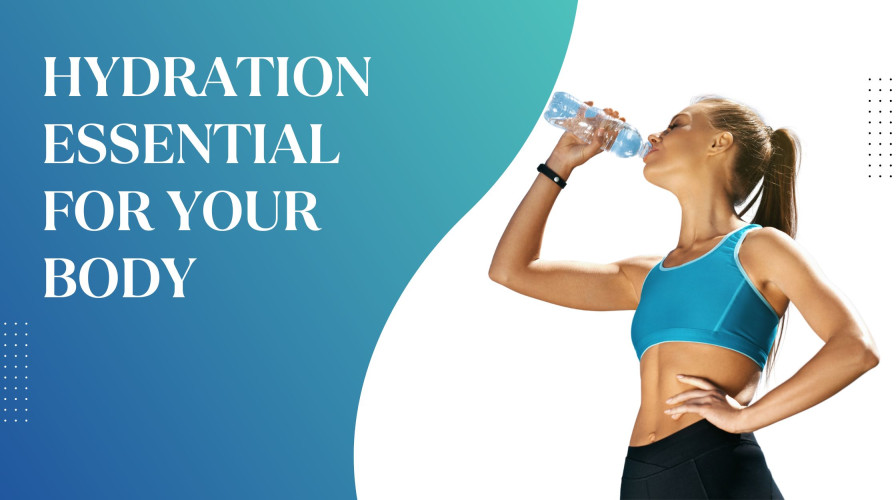Drink Up: The Essential Role of Hydration for Your Body's Health
Water is the elixir of life, and its importance for maintaining optimal health cannot be overstated. Hydration plays a critical role in nearly every bodily function, from regulating temperature to aiding digestion. Understanding why water is essential and how to stay properly hydrated can significantly enhance your overall well-being.
The Vital Functions of Water
Water constitutes about 60% of the human body, highlighting its fundamental role in our physiological processes. Here are some key functions of water in the body:
Regulates Body Temperature
Water is essential for maintaining body temperature through the process of sweating and respiration. When you’re overheated, sweat evaporates from your skin, cooling you down and helping to maintain a stable internal temperature.
Aids Digestion and Nutrient Absorption
Water is crucial for proper digestion and the absorption of nutrients. It helps break down food in the stomach, allowing nutrients to be absorbed more efficiently in the intestines. Adequate hydration ensures that your digestive system functions smoothly and prevents issues like constipation.
Supports Circulatory Health
Blood, which is over 90% water, transports oxygen and essential nutrients to cells throughout the body. Proper hydration ensures efficient circulation, supporting cardiovascular health and overall energy levels.
Lubricates Joints and Cushions Tissues
Water acts as a lubricant for joints and cushions vital organs and tissues. This helps to maintain flexibility, reduce joint pain, and protect against injury.
Detoxifies the Body
Water aids in flushing out toxins and waste products through urine, sweat, and bowel movements. Proper hydration supports kidney function and helps maintain a healthy urinary tract.
Maintains Skin Health
Adequate hydration keeps your skin hydrated, improving elasticity and reducing the appearance of wrinkles. Water also helps to clear toxins from the skin, promoting a healthy and radiant complexion.
The Signs of Dehydration
Dehydration occurs when the body loses more water than it takes in. Common signs of dehydration include:
Thirst: The most obvious signal that your body needs more water.
Dry Mouth and Skin: Reduced saliva production and dry, flaky skin are indicators of dehydration.
Fatigue: Dehydration can lead to decreased energy levels and overall fatigue.
Headache: Insufficient hydration can cause headaches and dizziness.
Dark Urine: Urine that is dark in color and has a strong odor often indicates dehydration.
Muscle Cramps: Lack of water can lead to muscle cramps and spasms.
How Much Water Do You Need?
The amount of water each person needs can vary based on factors like age, weight, activity level, and climate. A common recommendation is to drink at least eight 8-ounce glasses of water a day, known as the "8x8 rule." However, some experts suggest aiming for half of your body weight in ounces. For example, if you weigh 150 pounds, you should aim for 75 ounces of water daily.
Tips for Staying Hydrated
Here are some practical tips to help you maintain optimal hydration:
Carry a Water Bottle: Keep a reusable water bottle with you throughout the day as a reminder to drink regularly.
Set Reminders: Use phone alarms or apps to remind you to drink water at regular intervals.
Eat Water-Rich Foods: Incorporate fruits and vegetables with high water content, such as cucumbers, oranges, and watermelon, into your diet.
Start Your Day with Water: Begin each day with a glass of water to kickstart your hydration.
Flavour Your Water: Add natural flavours like lemon, lime, or cucumber slices to make your water more enjoyable.
Monitor Your Urine: Use the colour of your urine as a hydration gauge. Pale yellow urine usually indicates proper hydration.
Conclusion
Hydration is a cornerstone of good health, supporting numerous vital functions in the body. By understanding the importance of water and incorporating healthy hydration habits into your daily routine, you can improve your overall well-being, enhance physical performance, and prevent a range of health issues. Remember, staying hydrated is one of the simplest yet most effective ways to support your body’s health and vitality. Drink up and enjoy the benefits of proper hydration.








